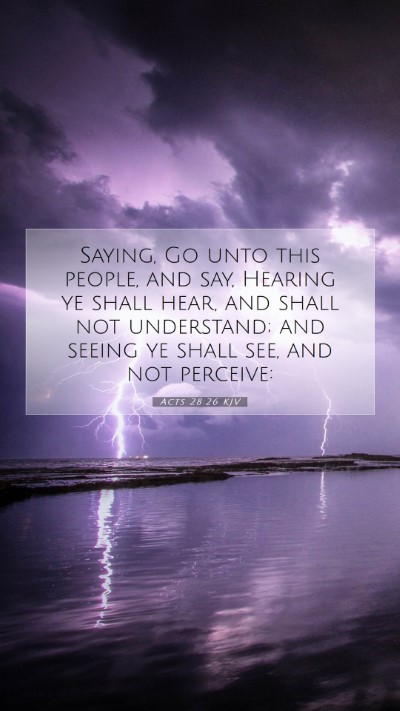Understanding Acts 28:26
Acts 28:26 states: "Go unto this people, and say, Hearing ye shall hear, and shall not understand; and seeing ye shall see, and not perceive." This verse reflects a prophetic message conveyed by the Apostle Paul, emphasizing a profound theme of spiritual blindness and deafness that plagues certain audiences. Below, we delve into the Bible verse meanings, Bible verse interpretations, and the broader implications of this passage as gathered from public domain commentaries.
Contextual Overview
Paul quotes Isaiah 6:9-10 directly, indicating that his ministry would be largely directed towards those who would remain unresponsive. This quote serves a pivotal role in understanding the Bible study insights related to how God's word is received by different people.
Verse Breakdown
- Main Message of the Verse: The hardness of heart that leads to an inability to understand divine truths.
- Application: This passage challenges readers to reflect on their openness to spiritual truths and the conditions of their hearts.
- Historical Context: Recognizing that Paul, a once zealous Pharisee, faced rejection from many Jewish people highlights the transition and acceptance of the Gospel among the Gentiles.
Public Domain Commentary Insights
This section combines insights from various respected commentaries:
- Matthew Henry: He emphasizes the sorrowful reality of those who hear but do not comprehend. The Spirit's work is often met with resistance, leading individuals to miss out on salvation. Henry calls for believers to remain faithful in their witness, even amid rejection.
- Albert Barnes: Barnes discusses the implications of the quotation from Isaiah, elaborating that the inability to perceive spiritual truths results from willful disobedience. He underscores that God’s mercy is abundant, yet dismissing it can lead to irreversible consequences.
- Adam Clarke: Clarke focuses on the consequences of spiritual blindness and deafness. He suggests that the rejection from the Jews signifies a transfer of the divine message to the Gentiles, indicating a shift in God's redemptive plan. Clarke also reflects on the importance of heart posture toward divine messages.
Spiritual Significance
This verse teaches about the importance of being perceptive to God's truth and the danger of complacency in spiritual matters. Understanding Scripture is not merely an intellectual exercise but involves an openness of heart and a willingness to respond to what God reveals.
Related Verse Cross References
- Isaiah 6:9-10 - The original prophecy of spiritual deafness.
- Romans 11:8 - Paul's reflection on the hardening of Israel.
- Matthew 13:14-15 - Jesus speaks about the prophecy of Isaiah concerning the people's inability to perceive truths.
Implications for Bible Study
This passage encourages Bible study groups to explore themes such as:
- How to interpret Bible verses regarding spiritual receptiveness.
- Understanding difficult Bible passages like Acts 28:26 in light of God's judgment and mercy.
- Applying Bible verses to daily life by examining heart attitudes toward God’s word.
Conclusion
In conclusion, Acts 28:26 serves as a powerful reminder to remain receptive to God’s truth and to actively engage in Bible study resources that foster a deeper understanding of spiritual truths. By embracing the teachings found in Scripture and remaining vigilant against spiritual apathy, believers can enrich their relationship with God and better discern the workings of His Spirit in their lives.


